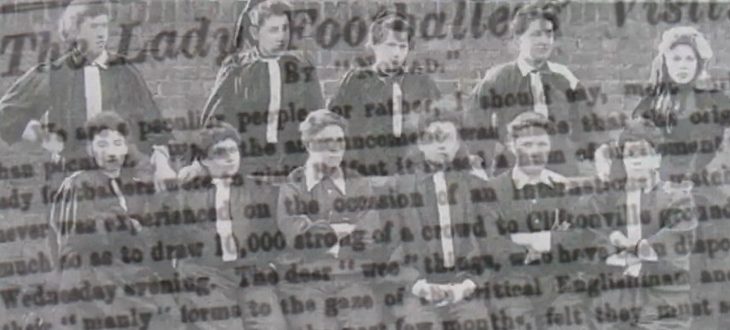Ladies first at Solitude
As a Football Club whose history is littered with historic firsts, it will come as little surprise for many Cliftonville supporters to learn that the first ever all-female match played in Ireland was staged at Solitude – and, on International Women’s Day, cliftonvillefc.net reflects on the landmark encounter between the ‘Reds’ and the ‘Blues’ of British Ladies FC.
Heritage Development Officer Paul Treanor notes that the friendly – which took place on June 19, 1895 – was deemed such a success that Solitude would host an additional Grand Challenge Match three days later that saw ‘The Lady Footballers’ (a team comprising players from the two sides that had faced off in the original game) taking on a male team from North End Juniors as part of a Fun Day that also included a place-kick competition and flat racing.
That such an occasion was deemed appropriate would have come as quite the surprise to anyone who read the match report in the Ulster Football & Cycling News, which deemed the match “a failure” – and which carried some highly questionable observations about not only the match but also the appearance of the competitors, as the following reproduction demonstrates.
The Lady Footballers’ Visit
We are a peculiar people, or rather, I should say, more curious than peculiar.
When the announcement was made that the original lady footballers were to visit Belfast, it raised a hum of excitement that never was experienced on the occasion of an international match, so much so as to draw 10,000 strong of a crowd to the Cliftonville ground.
The dear ‘wee’ things who have been disporting their ‘manly’ forms to the game of the critical Englishman and the hyper-critical Scot during the past few months felt they must see us, and accordingly they arrived by the ‘Adder’ on Wednesday and put up at the Hotel Shaftesbury, College Square North, where Mr Hicks attended to them.
At first sight the Ladies did not strike me as being able to tackle our winter pastime and, were, to say the least of it, in point of stature, a most uneven lot.
The goalkeepers and backs (for here let me say the ladies played the best code of the two – Association) being perhaps an exception.
It was a quarter of an hour late, or 7.45, before the game was started, the Reds attacking the pavilion goal, for in a case of this sort it does not matter much who wins the toss.
Cries of “go on Linfield and Cliftonville”, for it was Blues v Reds, was heard all over the field.
The Blues had the best forwards; but what defects the Reds attacking department had was amply atoned for by the capital display of outside-left work done by ‘little Daisy’, whom a few of the crowd were a bit dubious of as regards sex, owing to Daisy’s lively movements.
Be this so or not, the latter made the Blues’ custodian kick and punt out, and she was the girl to do it, her drop-kicks being quite artistic and making Tom Scott, our international custodian, blush in consequence.
As a result of a cute manoeuvre of the aforementioned ‘kid’, the Reds, amidst tumultuous cheers, shot a goal. There is no use in worrying one with the details, as that was all the scoring, the Reds winning by a goal to nil.
We must say candidly the teams played much better than we anticipated and all round did capitally.
Of course the display only served to make the more enthusiastic ones wish it had been Linfield v Cliftonville but they must ‘bide a wee’.
I do not know what the gate totalled but neither the ladies nor Cliftonville would lose by the visit. There was a beautiful ‘break’ at the unreserved gate and about a cool thousand got in free. This is mere detail when the crowd tots up to a matter of 10,000 with perhaps 5,000 more wanting in.
Our wish to see ‘ye faire ones’ here has been gratified, but as a show of football it was a failure, which can only be expected.
Perhaps indicative of prevailing attitudes of the time was that, in a letter of complaint, ‘Mrs Graham’ – who had been the Blue team’s goalkeeper during the game – wrote to Ulster Football & Cycling News not to list grievance at the condescending tone of the article or the unnecessary conjecture about the participants’ appearance, but instead to take issue with the awarding of the contest’s only goal.
While the author of the piece insisted that “there is no use in worrying one with the details”, Mrs Graham, who was also the captain of her team, insisted that she had deliberately allowed the ball to cross the line because she knew the scorer was in an offside position – only for the referee to disagree.
“Mr Referee informed me, when I claimed, that I had ‘played the ball’ and allowed a goal,” she wrote.
“This might have been according to the now obsolete reading of the rule, but not as I or any of the League clubs in Great Britain understand it as at present given.”
Though disagreements with officialdom remain an almost integral part of the modern day game, thankfully attitudes towards women in football have moved on – and Cliftonville Football Club are proud of the part Solitude played in helping Irish sport take its first step down that road some 127 years ago.


